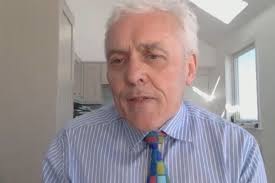By Ben Kerrigan-
Britain’s most vulnerable, that is, those in the age risk bracket and those with underlying issues may have to self isolate until a vaccine is developed, professor Costillo has said
Parliament’s Health and Social Care Committee was told by leading physician Professor Anthony Costello that the country must face up to the “harsh reality” that it did not react quickly enough to warnings about COVID-19.
The professor from University College London’s Institute for Global Health, told MPs at the Parliament’s Health and Social Care Committee that the UK that about 10% of the Uk population may need to be quarantined for up to a year even after the current lockdown is slowly eased. He said Britain would likely end up with the highest coronavirus death rate in Europe, greater than even Spain and Italy. He said:
“We all hope that the national lockdown and social distancing will bring about a large suppression of the epidemic; however, we are going to face further waves,” he said.
“We need to make sure we have a system in place that can not just do a certain number of tests in the laboratory.
“We also need a system at district and community level to test people rapidly in the community, in care homes, and make sure the results get back to them very quickly.
“We need to maintain social distancing of some kind when we lift the national lockdown, by focusing on the people we really want to lockdown, which are cases and contacts.
“You need to find cases, test them if you can, trace their contacts, isolate them, do social distancing – but most importantly of all you do it all at speed.”
“We have to get the economy going and if it means locking down 10% of our population, even giving them incentives to stay in quarantine and with digital apps to help monitor their symptoms and give them support, that’s the way to really keep this going until we get a vaccine and safe herd immunity,” he added.
The committee is conducting an inquiry into the preparedness of the UK to deal with such an outbreak, its central focus being to contain the virus, safeguard the public health, and the assess the NHS coping capacity. Costillo said the British government “can make sure in the second wave we’re not too slow”.
“We will probably have the highest death rate in Europe, we have to face the reality of that,” he said.
“We were too slow on a number of things, but we can make sure that in the second wave we’re not too slow.”
“We all hope that the national lockdown and social distancing will bring about a large suppression of the epidemic; however, we are going to face further waves,” said Professor Costello.
“We need to make sure we have a system in place that can not just do a certain number of tests in the laboratory.
“We also need a system at district and community level to test people rapidly in the community, in care homes, and make sure the results get back to them very quickly.”We need to maintain social distancing of some kind when we lift the national lockdown, by focusing on the people we really want to lockdown, which are cases and contacts.
he former health secretary told BBC Radio 4’s World at One: “If we’re going to be in a position where we can track and trace every single person who has Covid or might have had Covid in three weeks’ time – because that’s when we could next potentially end the lockdown – well that is a huge logistical undertaking.”
In evidence to the Health Committee by video link, Prof Costello said that a “community protective shield” will be needed when the UK comes out of lockdown to prevent another large-scale outbreak.
This could involve keeping up to one in 10 of the population identified as most likely to be infected in quarantine, while the rest of the country goes back to work, he said.
Prof Costello, the director of UCL’s Institute for Global Health and a former senior official of the World Health Organisation, said that “the harsh reality” is that “we were too slow with a number of things, adding: “We can make sure in the second wave we’re not too slow.”
“You need to find cases, test them if you can, trace their contacts, isolate them, do social distancing – but most importantly of all you do it all at speed.”We have to get the economy going and if it means locking down 10% of our population, even giving them incentives to stay in quarantine and with digital apps to help monitor their symptoms and give them support, that’s the way to really keep this going until we get a vaccine and safe herd immunity,” he added.
“You need to find cases, test them if you can, trace their contacts, isolate them, do social distancing – but most importantly of all you do it all at speed.”We have to get the economy going and if it means locking down 10% of our population, even giving them incentives to stay in quarantine and with digital apps to help monitor their symptoms and give them support, that’s the way to really keep this going until we get a vaccine and safe herd immunity,” he added.

